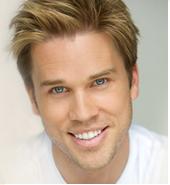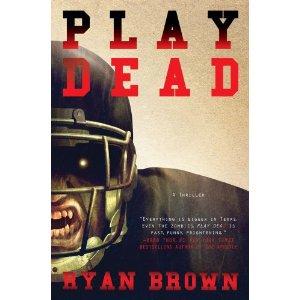Over the weekend, I finished reading PLAY DEAD, the debut zombie novel by actor Ryan Brown. I greatly enjoyed it, and asked Mr. Brown if I could interview him for this blog. He graciously agreed, and our exchange is below. (I have inserted some hyperlinks and italicized book/movie titles.)
Scott Kenemore: I really enjoyed the portrait of small town life in Killington, TX you portray in PLAY DEAD In this connection, the book’s opening pages overwhelmingly reminded me of Stephen King, who often begins novels by immersing the reader in small town life in fictional places like Castle Rock and, most recently, Chester’s Mill, and then letting the local heroes and villains naturally emerge. Are you a fan of Stephen King’s narrative approach? Are there other horror writers who informed the setting you used for PLAY DEAD?
Ryan Brown: Like so many writers of my generation, I grew up reading Stephen King, so there’s no question he’s been a huge influence on me. He’s the master at revealing the dark underbelly that often lies beneath the idyllic American small town. The quiet little hamlets of his stories usually have a sort of Norman Rockwell quality to them, which makes the evil that King unleashes that much more formidable. I think it’s the same quality that makes books like To Kill a Mockingbird and In Cold Blood so powerful. Robert McCammon’s Boy’s Life is one of my favorite books of all time, and is a great example of dark forces lurking beneath an otherwise idyllic small southern town. Joe Lansdale also does this extremely well (usually in East Texas, where PLAY DEAD was set). His book, The Bottoms, is another example of a terrific use of setting.
SK: What are your favorite zombie movies? Did any of them inform or influence your writing of PLAY DEAD?
RB: My favorite zombie movies – in fact, all of my favorite horror movies – are the ones that make me laugh as much as they scare me. The Evil Dead trilogy was a big influence on me. The films got lighter and funnier each time, and I probably liked the third film (Army of Darkness) the best. I thought Shawn of the Dead was genius. I don’t think there’s a zombie writer out, myself included, who hasn’t been impacted by Romero’s work. An American Werewolf in London obviously isn’t a zombie movie, but I think it’s a great film that perfectly combines elements of horror and comedy. I referred to that one a lot while writing PLAY DEAD.
SK: Though zombie novels are relatively rare, I feel like football novels might be even rarer! (Dan Jenkins’ Life its Ownself and Semi-Tough are the only ones I can think of.) Were there football or sports novels that inspired you when you were writing PLAY DEAD?
RB: Funny you should mention Dan Jenkins because he probably inspired the sports elements of PLAY DEAD more than anyone. We’re from the same part of Texas, and I’ve had the good fortune of knowing him personally. I don’t think anyone makes me laugh out loud while reading more than Dan Jenkins. In addition to the two books of his that you mentioned, I also loved Rude Behavior and Fast Copy – both hilarious novels about football. I’m not a golfer, but I loved Rick Reilly’s comic sports novels Missing Links and Shanks for Nothing. Peter Gent’s North Dallas Forty and Buzz Bissinger’s Friday Night Lights also inspired some of the themes of PLAY DEAD. Mike Lupica’s sports novels have also been a big influence. He always creates an incredible balance between humor and darkness.
SK: I thought that your use of the “Mona” character to create the zombies was a really interesting way to conflate traditional Haitian voodoo zombies with Romero-style flesheaters. When you were writing PLAY DEAD did you think/worry about your zombies fitting into a particular “type” or “mythology” of the walking dead?
RB: I didn’t worry too much about my zombies fitting into a specific mold. The great thing about writing fiction is that you set your own rules and parameters, and then work within them. Vampires, werewolves, zombies…when you look at all of the books and films made about them over the years, you see that they all have different abilities, powers, vulnerabilities, etc. If they all fit into the same mold, there would be no reason to keep bringing them back. I created a type of zombie that I thought would best serve the story I wanted to tell. I don’t think Romero’s zombies would remember the plays in a football playbook. Nor do I think my zombies would eat their parents. I think the differences between the monsters we’ve created are great. The best compliment I can receive about PLAY DEAD is that it is a ‘different’ take on the zombie story.
SK: (This is my only snarky question. Please forgive me.) When I physically picked up PLAY DEAD, I thought there was kind of a jarring contrast between the flesh-eating zombie on the front cover and the glossy photograph of you on the back cover. Was this dictated by a desire to bring fans of your acting career to the world of zombies? And have fellow horror authors (a group not known for being professionally good-looking) welcomed you into their fold, despite your success as a television actor?

RB: The dichotomy between the front cover and the author photo on the back was deliberate, but for a different reason than the one you mentioned. Our reasoning was that the book is a horror-comedy, not just a straight-out horror. We thought the art on the cover was terrific – gruesome and scary – and felt confident that it would attract the eye of the die-hard horror fans. But we wanted the picture on the back to lighten things up a little, in keeping with the comic tone of the book.
SK: The internet seems to hold some speculation that PLAY DEAD might be made into a film. Have you given any thought as to which actors might play certain characters from your novel?
RB: My wife and I have certainly had a few lively dinner conversations, tossing out the names of actors that we’d love to see in a PLAY DEAD film…but it’s all just for fun at this point. I think Mona would be a great role for any actress because she’s crazy and larger-than-life, and could really be played by a woman of any age or race. Fingers are crossed that it will happen one day!
SK: Finally, what’s been the most surprising thing about becoming a horror/humor novelist?
RB: The most surprising thing about becoming a horror/humor novelist is that I’ve become a horror/humor novelist. It’s one of those ‘if you asked me five years ago what I’d be doing…’ kind of things. I never saw this coming. But I’m having a blast, and feel incredibly blessed to see PLAY DEAD reach publication.
